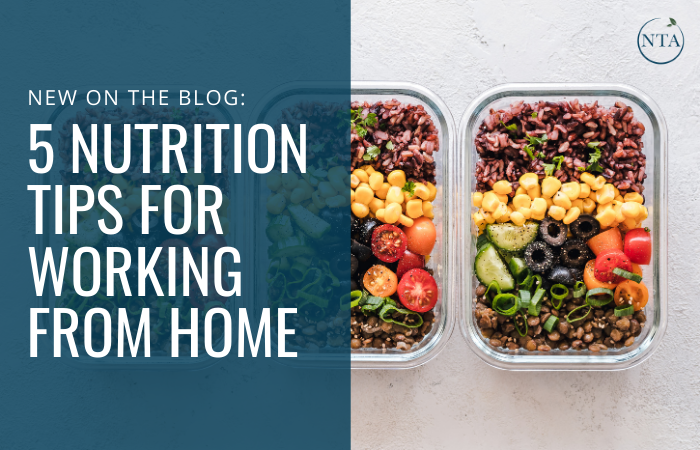
5 Nutrition Tips For Working From Home
Blog
5 Nutrition Tips For Working From Home

Whether you are brand new to working from home or a remote work pro this is for you.
Eating nourishing, nutrient-dense foods throughout the day is super important. Not only do they make you feel great, but also give you more energy and help you be more productive.
Here are five tips to help you prioritize nutrition while working from home.

Try to eat meals around the same time every day. This way, you won’t accidentally skip meals when you’re in the zone and haven’t looked at the time in 4 hours.
When you’re in the habit of eating at a certain time, that time serves as an opportunity to check in with your hunger level and eat a meal if you’re hungry.
Snacking all day when you’re not hungry keeps you from being in tune with your true hunger. It also often prevents you from ever seeking out a full meal. Full meals tend to include more nutrient-dense foods like vegetables and fat and protein sources that are harder (though not impossible) to find in snack form.
There is no rule you need to follow as to how frequently you should be eating. Some people find that 3 large meals a day with periods of fasting in between is best for them. Others find that eating every 2-3 hours helps them stabilize their blood sugar and support their hormones.
Whatever timing you prefer, a rhythm will help you be intentional with your meals and ensure you’re getting the vitamins and minerals you need from your diet.

Water is vital for healthy functions like digestion, detoxification, and the immune system. Dehydration can cause or contribute to fatigue, anxiety, irritability, cramps, headache, heartburn, constipation, and back pain.
If you keep a water bottle at your work area, you’ll be more likely to sip water throughout the day. Try to drink most of your water in between meal times, not with your meals.
Why? Sipping throughout the day is better for your digestion than drinking water with your meals because excess liquid can water down digestive juices that are needed to break down food and alter the pH of the stomach environment.
A good rule of thumb to figure out if you’re drinking enough water is to divide your body weight by two. That number in ounces is your starting point.
Extra credit: find or invest in a water bottle you LOVE. This may seem silly, but if you love your water bottle, you’ll drink more water!

All three macronutrients (fat, protein, and carbs) are important sources of energy, but fat tends to be the one people are most afraid of because of the misconceptions that dietary fat is the same as body fat or causes heart disease.
In reality, fatty acids are a very important part of a nutrient-dense diet.
Fatty acids are a great concentrated source of energy. They help regulate energy absorption by slowing the absorption of food, so they also keep you satiated for longer.
This is why having fat in your diet is so valuable—it gives you a slow-burning energy to get through your workday.
Here are ideas of great fat sources to incorporate into your diet:
- Walnuts
- Pumpkin seed
- Cod Liver Oil
- Coconut Oil
- Eggs
- Butter
- Extra Virgin Olive Oil
- Avocados and Avocado Oil
- Duck/Chicken/Goose/Turkey Fat
- Salmon and other fish
- Fatty animal meat from pastured animals

If you plan out your meals for the week during the weekend, you’ll be more likely to choose nutrient-dense options.
There are a few ways to do this, with varying degrees of work up front.
For starters, you can make nutrient-dense food available. Purchase foods like meat, vegetables, fruits, grains, and nuts and seeds. Keep your fridge, freezer, and pantry stocked with options you can make.
If you want to do all the leg work up front so that you can have grab-and-go meals ready throughout the week, take a few hours on a Saturday or Sunday to make big batches of several meals and separate them out into smaller containers.
We find that chilis, soups, casseroles, and sheet pan meals work particularly well. We love these meal-prep-friendly sheet pan recipes created by one of our graduates, Alison Marras.
It’s a lot of work up front but the pay-off is that instead of mustering up the willpower to cook on a Wednesday afternoon, you can sit back, relax, and enjoy your pre-prepared meal.

A nutrient-dense diet doesn’t have to mean quinoa, broccoli, and chicken for every meal. A nutrient-dense diet can be fun and flavorful and even a form of self-expression!
It can be easy to fall into the rut of eating the same things week-in and week-out. Not only does this prevent us from getting the diverse variety of nutrients we need, but it can also make us sick and tired of the same ole’ veggies we always make.
Food is for fuel, but it is also for pleasure. Cook things you enjoy! Try new recipes to give your usual rotation a break. Here are some ideas to get you started:
Taking Care from Home
It’s far too easy to neglect your health when working from home. There always seems to be something else to do. But prioritizing nutrition is worth it, and following these tips are a great way to start.
- Find a rhythm that works for you
- Keep a water bottle with you
- Eat adequate fat
- Plan meals ahead of time
- Have fun with it
You take care of many things throughout the day—make yourself one of them.
Want your recipe or article to be featured on our blog? Email our team Marketing@nutritionaltherapy.com with your full name, article, a short bio in third person, and a headshot. We may feature you in an upcoming blog post.
Resources:
- Nutritional Therapy Association (2019). Hydration Module Study Guide. Olympia, WA.
- Hazzard, V. M., Telke, S. E., Simone, M., Anderson, L. M., Larson, N. I., & Neumark-Sztainer, D. (2020, January 31). Intuitive eating longitudinally predicts better psychological health and lower use of disordered eating behaviors: findings from EAT 2010-2018. Retrieved from https://www.ncbi.nlm.nih.gov/pubmed/32006391
- Nutritional Therapy Association (2019). Fatty Acids Study Guide. Olympia, WA.
Join us for a Live Webinar with one of our Instructors and Admissions Advisors!
During this call, you’ll explore and learn:
- How to create a rewarding career in holistic nutrition that will give you the confidence and competence to replace your full-time income (whether you’re new to nutrition or or using it to enhance your current services)
- How our unmatched education and instructor support sets our NTP program apart from other nutrition programs
- How graduates are successfully using their education and the many career opportunities available to you
- If the NTP program is the right fit for you and how to move forward in financing your education







